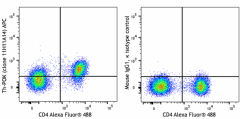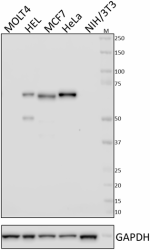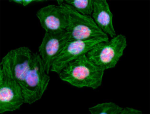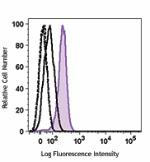- Clone
- 11H11A14 (See other available formats)
- Regulatory Status
- RUO
- Other Names
- T-helper-inducing POZ/Krueppel-like factor, Zinc finger and BTB domain-containing protein 7B (ZBTB7B), Krueppel-related zinc finger protein (cKrox), Zinc finger protein 67 homolog (ZFP-67)
- Isotype
- Mouse IgG1, κ
- Ave. Rating
- Submit a Review
- Product Citations
- publications

-

Human PBMC lymphocytes were surface stained with anti-human CD4 Alexa Fluor® 488, and were fixed and permeabilized with True-Nuclear™ Transcription Factor Buffer Set. Cells were then stained with anti-Th-POK (ZFP-67) (clone 11H11A14) APC (left) or mouse IgG1, κ APC isotype control (right).
| Cat # | Size | Price | Quantity Check Availability | Save | ||
|---|---|---|---|---|---|---|
| 656405 | 25 tests | £111 | ||||
| 656406 | 100 tests | £256 | ||||
Th-POK is a member of the BTB-POZ domain-containing zinc finger transcription factor family. It regulates gene expression during intrathymic T cell differentiation. A single autosomal recessive mutation of the Th-POK gene results in the absence of mature CD4+ helper T cells, called helper-deficient (HD) phenotype. In Th-POK deficient mice, MHC class II restricted thymocytes are redirected to the CD8+ T cell lineage. On the contrary, forced expression of Th-POK redirects MHC class I restricted thymocytes to the CD4+ T cell lineage. Inactivation of Th-POK in mature CD4+ T cells results in induction of the genes preferentially expressed in CD8+ T cells, such as CD8, granzyme B, and IFN-γ. These findings suggest that Th-POK is essential in promoting commitment of immature T cells to the CD4 lineage and maintaining the characteristics of mature CD4+ T helper cells.
Product DetailsProduct Details
- Verified Reactivity
- Human
- Antibody Type
- Monoclonal
- Host Species
- Mouse
- Immunogen
- Partial human Th-POK recombinant protein (197-345 a.a.)
- Formulation
- Phosphate-buffered solution, pH 7.2, containing 0.09% sodium azide and BSA (origin USA)
- Preparation
- The antibody was purified by affinity chromatography and conjugated with APC under optimal conditions.
- Concentration
- Lot-specific (to obtain lot-specific concentration and expiration, please enter the lot number in our Certificate of Analysis online tool.)
- Storage & Handling
- The antibody solution should be stored undiluted between 2°C and 8°C, and protected from prolonged exposure to light. Do not freeze.
- Application
-
ICFC - Quality tested
- Recommended Usage
-
Each lot of this antibody is quality control tested by intracellular immunofluorescent staining with flow cytometric analysis. For flow cytometric staining, the suggested use of this reagent is 5 µL per million cells in 100 µL staining volume or 5 µL per 100 µL of whole blood. It is recommended that the reagent be titrated for optimal performance for each application.
- Excitation Laser
-
Red Laser (633 nm)
- Application Notes
-
NOTE: For flow cytometric staining with this clone, True-Nuclear™ Transcription Factor Buffer Set (Cat. No. 424401) offers improved staining and is highly recommended.
This clone displays a similar affinity to BioLegend clone W15147A by western blot. However, this clone does not recognize mouse TH-POK. - RRID
-
AB_2910491 (BioLegend Cat. No. 656405)
AB_2910491 (BioLegend Cat. No. 656406)
Antigen Details
- Structure
- 539 amino acids, predicted molecular weight of 58 kD; contains four C2H2-type zinc finger regions that are responsible for DNA binding; contains a BTB-POZ domain which is involved in homodimerization and association with other factors
- Distribution
-
Nucleus
- Function
- Transcription factor that regulates CD4 lineage commitment of immature T-cell precursors; acts as a transcriptional repressor of collagen and fibronectin genes
- Interaction
- Acetyltransferase p300
- Biology Area
- Cell Biology, Immunology, Transcription Factors
- Molecular Family
- TCRs
- Antigen References
-
1. Kappes DJ. 2010. Immunol. Rev. 238:182.
2. Mariani F, et al. 2013. PLoS One. 8:e54488.
3. Zhang M, et al. 2010. J. Immunol. 185:3960.
4. Egawa T, et al. 2008. Nat. Immunol. 9:1131.
5. Wildt KF, et al. 2007. J. Immunol. 179:4405.
6. Setoguchi R, et al. 2009. J. Immunol. 183:4467. - Gene ID
- 51043 View all products for this Gene ID
- UniProt
- View information about Th-POK on UniProt.org
Related Pages & Pathways
Pages
Related FAQs
Other Formats
View All Th-POK Reagents Request Custom Conjugation| Description | Clone | Applications |
|---|---|---|
| Purified anti-Th-POK (ZFP-67) | 11H11A14 | WB,ICC |
| PE anti-Th-POK (ZFP-67) | 11H11A14 | ICFC |
| APC anti-Th-POK (ZFP-67) | 11H11A14 | ICFC |
| PE/Cyanine7 anti-Th-POK (ZFP-67) | 11H11A14 | ICFC |
Compare Data Across All Formats
This data display is provided for general comparisons between formats.
Your actual data may vary due to variations in samples, target cells, instruments and their settings, staining conditions, and other factors.
If you need assistance with selecting the best format contact our expert technical support team.
-
Purified anti-Th-POK (ZFP-67)

Total cell lysates (15 µg total protein) from MOLT4 (negativ... 
Hela cells were fixed with 2% paraformaldehyde (PFA) for 10 ... -
PE anti-Th-POK (ZFP-67)

Human peripheral blood lymphocytes were surface stained with... 
C57BL/6 thymocytes were surface stained with CD8 APC/Cyanine... -
APC anti-Th-POK (ZFP-67)

Human PBMC lymphocytes were surface stained with anti-human ... -
PE/Cyanine7 anti-Th-POK (ZFP-67)

Human PBMC lymphocytes were surface stained with anti-human ...
 Login / Register
Login / Register 












Follow Us